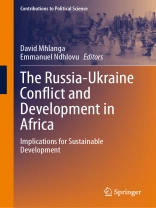This edited volume provides a comprehensive analysis of the intricate dynamics of the Russia-Ukraine conflict, particularly within the context of sustainable development in Africa. The book explores the multifaceted consequences of the war, drawing attention to its socioeconomic, environmental, and political implications. It also emphasizes the significance of sustainable development on a global scale, positioning itself at the intersection of conflict studies and sustainable development literature.
Chapters discuss the international response to the conflict, including sanctions on Russia and disruptions in global supply chains, which has had significant implications for countries in Africa that rely on Russia and Ukraine for essential commodities. The history and root causes of the conflict are analyzed, highlighting the contrasting narratives – the pro-Russian perspective and the pro-Western viewpoint. Underscoring the impact of the Russia-Ukraine conflict on global peace, sustainable development, and the achievement of Sustainable Development Goals (SDGs) by the 2030 deadline, this volume will be of interest to researchers and students focusing on development, food systems, peace and conflict, security studies, international relations, and the SDGs.
表中的内容
Introduction Russo-Ukrainian War and the Global Disruption.- PART 1:CONCEPTUALISATION AND THEORISATION OF KEY CONCEPTS.- Historicising and theorising the Russo-Ukrainian Relationship since the Soviet Union Collapse.-Historicising and Theorising Sustainable Development.- A Critical Analysis of the Sustainable Development Goals Framework in the Wake of the Russia-Ukraine Conflict.- PART II: CONCEPTUALISING THE RUSSO-UKRAINIAN WAR IN THE CONTEXT OF SUSTAINABLE DEVELOPMENT.- Russia-Ukraine War and Sustainable Development Goals: Is Arming Ukraine the Answer to Conflict Resolution.- Peace, Justice, Diplomacy, and the Russo-Ukrainian War: Implication for Sustainable Development.- Expectations, Self-fulfilling Prophecy and SDGs: An Examination of Russia Ukraine War.- A Theoretical Investigation of the Conflict of the Russian-Ukraine War and the Impact on Global Development.- PART III: THE RUSSIA-UKRAINE WAR AND THE GLOBAL FOOD SYSTEM.- Effect of the Russia-Ukraine War on Food and Hunger Sustainable Development Goals in Africa.- Impacts of the Russia-Ukraine War on Global Food Security: Towards More Sustainable and Resilient Food Systems.- Sustainable Development Goals: A need for relevant indicators.- Exploring the effects of Russia-Ukrainian conflict in achieving sustainable development goal 2 (Zero Hunger) in Zimbabwe.- The Implications of Russia and Ukraine’s War in the Fight Against Poverty and Hunger in Sub-Saharan Africa: Erudite Reflections on the Need for Responsible Leadership for Social Sustainability and Economic Development in a Developing Context.- Understanding the impact of the Russia-Ukraine war on food and nutrition security in Zimbabwe.- Examining the impacts of the Russo-Ukrainian Conflict on Zimbabwe’s Progress Towards Sustainable Development Goal 2 (Zero Hunger).- Implication of the Russia and Ukraine’s War over the Fight against Poverty.- The Implication of Russia and Ukraine’s War on Human Rights from a Sustainable Development Goals Perspective.- The Russia Ukraine war, Global Energy Supply and Sustainable Development.- Examining the Broader Impact: The Russia-Ukraine Conflict and its Ramifications on Poverty Alleviation and Hunger.- Social Media Reporting on Russian-Ukrainian Conflict: Impact on Young South Africans.- Implications of Russia-Ukraine war on Uganda’s fertilizer and wheat supply.- The Russia-Ukraine Conflict and Its Impact on Tourism and the Socio-Economic Consequences in South Africa.- PART IV: CONCLUSIONS AND POLICY RECOMMENDATIONS.- Towards a Functional Food System in Africa.- Conclusions: The Russia-Ukraine war and Sustainable Development Goals in Africa.
关于作者
David Mhlanga is an Associate Professor at the University of Johannesburg in South Africa. He received his Ph D in economics from North-West University (South Africa). Dr. Mhlanga conducts research in the fields of development economics, education economics, economics of artificial intelligence, health economics, and Industry 4.0.
Emmanuel Ndhlovu is a peasant scholar-activist, and a lifelong student of development educated at the universities of Zimbabwe and South Africa. He holds a Ph D in Development Studies from the University of South Africa. He conducts research on land reform, political economy, peasant livelihoods, migration, food sovereignty, and on development. Emmanuel is currently with the University of Johannesburg, South Africa, as a postdoctoral researcher.












